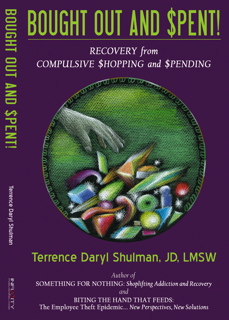Compulsive Shopping Decoded: Warning Signs & Treatment
 Do to an overwhelming response following last week’s Confessions Of A “Recovering” Shopaholic post (I guess that’s good and bad), I thought I’d do us all a favor by delving a little deeper into the subject by interviewing one of the industry’s leading compulsive buying experts, Terry Shulman.
Do to an overwhelming response following last week’s Confessions Of A “Recovering” Shopaholic post (I guess that’s good and bad), I thought I’d do us all a favor by delving a little deeper into the subject by interviewing one of the industry’s leading compulsive buying experts, Terry Shulman.
As Founder of The Shulman Center For Compulsive Theft & Spending, Terry shares his personal experiences and provides thoughtful insight to questions that could help you (or those near and dear to you) to get back on the road to recovery.
FJ: Can you tell Fashion Junkie readers a little bit about your background and why you decided to establish The Shulman Center?
TS: I’ve been an attorney since 1992 and a certified social worker and addictions therapist since 1997. I have been in recovery from shoplifting addiction since 1990 and started C.A.S.A.—Cleptomaniacs And Shoplifters Anonymous in 1992. I have always been interested in addictions since my father struggled with alcoholism, gambling, and overshopping. In working with members of my support groups as well as with private counseling clients, there was a lot of money issues, spending issues, stealing issues that were not being addressed in a specialized and serious-minded way.
FJ: What kind of services do you offer at The Shulman Center?
TS: I offer professional, specialized counseling in person here in the metro-Detroit area as well as by phone. 90% of my counseling clients are phone clients. I am also set-up to do phone or video-conferencing through SKYPE. I am the author of 3 books—on shoplifting, employee theft, and compulsive shopping & spending—and offer my books as helpful tools for education and change. I direct persons to resources (books, support groups, counseling, financial services, etc.). I write articles and do interviews both in print, on radio, and on TV to educate the public. I put on seminars and speak at seminars or trainings on theft and/or spending/money issues. Finally, I do private consulting with individuals and companies about theft/spending/money issues.
FJ: How do you know if you’re a compulsive buyer? What are the typical traits/warning signs?
TS: The traits are similar to most addictions/compulsions but include:
- stress or emotional turbulence related directly or indirectly to shopping or spending;
- trouble managing debt, paying bills, etc.
- an increasing preoccupation with shopping/spending which results in changes in sleep, eating, productivity, schedule management
- arguments over money/spending with friends or family or significant others
- a loss of control over one’s limits, repeatedly breaking of promises to stop or reduce shopping/spending
- lying about what you’ve spent or where you’ve been, hiding purchases, opening up secret accounts, stealing to get money to buy things and/or pay off debt
- increase depression, anxiety, guilt, remorse, low self-image and esteem
- a pervasive feeling of pressure that something bad is going to happen
FJ: What types of people are most at risk?
TS: All people are at risk of becoming compulsive shoppers/spenders but some more than others, including:
- young people (who tend to be more image-conscious and peer group conscious and more impulsive and naïve about financial management
- persons with previous or current addictive-compulsive behaviors (there’s a tendency to switch, replace, or transfer behaviors)
- persons who are image-conscious, perfectionistic, control-oriented or persons who tend to give gifts to others excessively to win love, buy approval, attempt to avoid abandonment (co-dependents)
- parents with children (may overindulge their kids out of guilt for not giving them enough time/energy/love)
- persons with poor impulse control or with ADHD or OCD
- persons who frequent stores a lot, watch TV a lot, or are online a lot (open to more frequent advertising and messages and triggers/temptations and access to goods)
- persons who grew up either materially or emotionally deprived or persons who grew up materially spoiled or overindulged
FJ: I’ve read that people who suffer from compulsive buying disorder exhibit similar traits to that of a gambler or drug addict. Is this true and why?
TS: Yes, all addictions are similar in that “one is too many and a thousand is never enough.” Once you’re hooked, you chase that feeling of exhilaration and there’s no prolonged satisfaction. The gambler—whether she wins or loses keeps chasing the high; it’s not really about the money. Same thing for the shopper or spender—it’s no longer about the thing bought or the thing spent on; it’s the feeling of satisfaction, calmness, euphoria, completeness the shopper/spender feels for the moment.
FJ: Does the saying, “once an addict, always an addict” also apply to a compulsive buyer? Assuming this is true, what are the chances of having a relapse?
TS: I’m not dogmatic about this but tend to agree with this conventional wisdom. The interesting thing about some addictions and recovery such as with shopping/spending, sexual addiction, co-dependency, workaholism, and overeating is that we are not shooting for sustained and complete abstinence (one day at a time) as like with alcohol, drugs, shoplifting, gambling but, rather, balance and manageability. Recovering overeaters need to eat and find a new relationship to food and their bodies; sex addicts need to find a new healthy relationship to sex and sexuality; co-dependents need to learn how and when and how much to help or give to others not stop completely; workaholics need to learn balance with work, etc. So, compulsive shoppers/spenders need to learn what they are really shopping for, identify and begin to heal their core issues/wounds, and develop a rigorous recovery program of support, accountability, honesty, and filling up of their time in a healthy, productive and self-affirming way.
FJ: What are some of the treatment options for a compulsive buyer… do they really work?
TS: As with any addiction-recovery treatment strategy, success is measured one day at a time for the rest of one’s life. Some factors that add to a successful outcome are: competency of the therapist/treatment program, commitment of the client/patient, strength of the support system, medication management (if needed), degree of honesty, avoidance of triggers (negative people/places), change of lifestyle, consistent support group attendance, ongoing interest in reading books and literature about this particular subject as well as personal/spiritual growth in general, and an acceptance of recovery as ongoing rather than looking for a “cure” or endpoint.
FJ: I’m embarrassed to ask, but I have to… what are your thoughts about the movie, Confessions of A Shopaholic? Do you think Isla Fisher’s character (Becky Bloomwood) was portrayed in a realistic manner?
TS: I’ve seen the movie twice since it came out and have recently read the book as well. Of course, the book and movie are not intended as serious docu-dramas so, no, they don’t portray things realistically for the most part either in actuality or tone; things are dramatized for laughs and comedic effect. However, there were aspects both in the book and in the movie that gave a glimpse of what many “shopaholics” experience: anxiety, distraction and shame over debt; dishonesty in relationships which cause problems; humiliation; denial; attempts to minimize or excuse debt; excessive hoarding; lying and hiding and sneaking to avoid paying debts or to avoid discovery by others of the problem; a lack of ability to focus on one’s higher talents and callings; the larger familial and cultural pressures to shop, spend, and uphold an image; and many unsuccessful attempts to reduce or stop shopping/spending. So, in sum, the character in the book/movie played by Isla Fisher was mostly for comic effect but did have some moments of pathos and distress that shone through.
By the way, The Shulman Center is given a small credit at the film’s end for permission to use “Shopaholics Anonymous” for the name of support group.
FJ: With retailers’ aggressive markdowns due to the depressed economy, it almost seems justified to be a “serial shopper.” What are your thoughts on this? What can someone who suffers from compulsive buying disorder do to stay away from the so-called “danger zones” (e.g. sample sales, deep in-store discounts, etc.)
TS: One of my favorite sayings is: “you have to spend money to save money.” People with a shopping/spending problem still need to avoid the deals because they are still shopping/spending with money they usually don’t have, driving themselves deeper into debt especially when using credit cards and accounting for interest, late fees, etc.—a deal isn’t always a deal in the end. Also, what about the time, energy, and focus lost on shopping/spending on deals. You feel a momentary victory, then what? Disgusted. Running out of space and hoarding is another problem. Arguments with others about the spending and clutter kill relationships. And, in the end, nothing we can have or own (money or things) can really fill the void and make us happy. Find other creative, fulfilling and inexpensive ways to spend our time and connect and be productive.
FJ: What do you think of the growing phenomenon of luxury “flash sale” sample sites or online shopping clubs such as Gilt.com and BeyondTheRack.com? These sites have garnered a cult following for selling deeply discounted designer apparel and accessories for a limited period of time to their members.
TS: I can understand the appeal: we all like to belong to a club and feel we’re a part of something exclusive, somewhat below the radar, and who doesn’t like a great deal?! Still, what are the costs ultimately and do they outweigh the perceived benefits. Many shopaholics, once they get well, report they can’t believe how crazy, misguided in values, and out-of-control they were. The newfound peace, meaning, and self-esteem they discover are priceless.
FJ: Can you recommend any other associations, books or websites that compulsive buyers can turn to if they need help?
TS: Besides my book “Bought Out and $pent: Recovery from Compulsive $hopping and $pending” and my website shopaholicsanonymous.org, I’d recommend Debtors Anonymous meetings and “Shopaholics Anonymous” meetings online at www.yahoogroups.com. I’d also recommend the counseling work of Dr. April Benson out of New York and her new book “To Buy or Not to Buy.”
FJ: Are compulsive buying tendencies highly correlated with any particular socio-economic demographic?
TS: As stated before, anyone can become a shopaholic or compulsive shopper/spender. I’ve worked with rich and poor alike (those who shop for Chanel to Shabby-Chic). One of the ironies is that, with the fledgling economy and almost everyone tightening their financial belts, there’s been a corresponding increase in compulsive shopping/spending both among the newly afflicted as well as those previously struggling; not only are the bargains hard to resist for many but just the stress and complex emotions related to the economic woes and other related losses and uncertainties make many even more vulnerable to trying to escape reality and soothe themselves through shopping/spending which makes things even worse and, of course, a vicious cycle continues until a bottoming out financially or emotionally or both.
Do you suffer from compulsive shopping? Share your stories with the Fashion Junkie community.
Filed: Interviews


















This is such an interesting article! I definitely have some compulsive shopping issues myself but I never realized how big of an issue it is. I recently read another blog that had some really valuable information on compulsive behaviors http://www.psychalive.org/2012/12/compulsive-shopping/, I highly recommend it!
Thanks so much for your kind words, Emma! Sp glad you enjoyed the post. More to come! Enjoy. xo Fashion Junkie